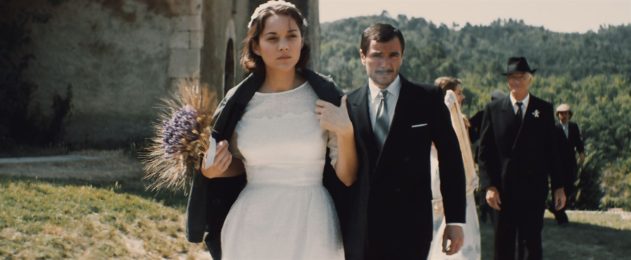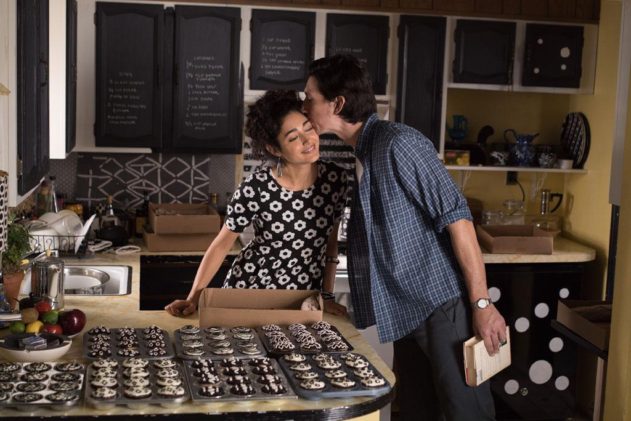CANNES FESTIVAL DAYS 4 AND 5, “American honey,” “Mal de Pierres” and “Paterson”
CANNES, France – “American Honey,” which I consider to be the best film out of this still-young Cannes Festival, played here last night. The Andrea Arnold-directed road movie stars newcomer Sasha Lane and Shia Labeouf and Riley Keough (Elvis’s granddaughter) and follows a crew of twentysomethings from all over the country (from Texas to Nebraska) who circle the mid-west selling magazine subscriptions. They’re ravers and skaters, young people who, like a young woman named Star (played by Lane) come from broken homes and bad marriages. Their van takes them from town to city and from state to state, they make their money, collect this commission, and wait for the next town. At no point does Arnold tell us what happens next for these kids and that, of course, is the strength of the film. In a Larry Clarkian way, the director tells us, “this is it, folks.” This is the road movie for the American millennial set, ambition optional.
Krystal (Keough), hardly older than the crew’s average age, runs this place, a kind of David Koresh for the QVC epoch. She hands out the assignments (who’ll go hussle which towns, which homes) in the morning and collects the receipts signed by subscription buyers, and the money—cash preferred. Each seller keeps 25% and the rest goes to the enterprise. It’s legitimate, these kids aren’t doing anything illegal notwithstanding their regular consumption of weed, which is now, thankfully, legal in a few of the states they’ve criss-crossed with their vans.
For “American Honey” Arnold enlisted D.P. Robbie Ryan as her lensman after their 2009 collaboration on “Fish Tank,” a film that was also selected at Cannes. The resulting images, breathtaking and just, have been tricked-out by one of the best soundtrack I’ve heard in years—the full listing of the songs, a mixtape of spellbindingly-gritty southern rap, was actually included in the production notes, which is unusual.
LISTEN: E-40, “Choices” from the soundtrack for “American Honey”
Ryan and Arnold together really do make a dream team. As the van cuts a trail of dust across the sun-soaked blacktop of the American Midwest the faces of the bourgeois townspeople, the oil men, the cowboys in their thirty-gallon hats, the oil derricks, the shopping malls on the other side of the tracks spread around on the screen, a testatement to this beautiful, rich and unequal land of ours. Credit is given to Arnold, a European filmmaker (she’s from the U.K.) for making a film about America and Americans that’s free of cliches. Road movie, Americana movie, millenial movie, name it what you will, but, truly, this is Star’s movie. Blake, who cried during the standing ovation she and the rest of the cast got during the premiere screening last night, is a newcomer to film so coming to Cannes under these conditions must’ve been overwhelming. Her character Star is at the beginning of the film when she first joins the group to the end, when a new girl joins them on their journey.
Lane, 20, was a student in Texas before making her debut in Arnold’s film. She’s moved to L.A. in order to pursue a career in acting.
And unless Jeff Nichols, Almodovar, Dardenne, Mungiu, Penn and Assayas and the few others have made some kind of incredible film I’m putting my money on this horse.
This year, as we discovered this morning with Nicole Garcia’s “Mal de Pierres,” is turning out to be a very strong year for women in film, the Cannes Festival’s efforts towards better parity and a slowly-changing paradigm shift in the industry being, perhaps, behind such a slew of quality films. Or perhaps women are becoming more self-confident in demanding better pay, better roles, better directing jobs and are getting considered for bigger-budget films.
French filmmaker Nicole Garcia started out as an actress in the sixties. The venerable seventy year-old filmmaker has made seven feature-length films, now, with “Mal De Pierres,” ridiculously translated as “From the land of the moon” for the English market, she’s made eight. With “Mal,” appearing in competition, Garcia takes us through an appreciable arc of the life of Gabrielle (played by Marion Cotillard), a provincial girl living on a farm who goes through a difficult young adulthood. Her mother (Brigitte Roüan) finds her someone (a farmhand on her estate) to marry (Alex Brendemühl) so she can go to the city and have a life. Jump forward a few years. When it is found that she has kidney stones (from the “pierres” of the title) her husband, who by now has launched a successful construction business, sends her off to the Swiss Alps for thermal cure (a very European concept, look it up). It is there she’ll meet André Sauvage, played by Louis Garrel. A bigger-than-life romance will follow, with a surprising twist at the end.
With “Mal de Pierres” Garcia has directed her first masterful film. Putting romance on the screen like this, splashing an emotion that most of us will suffer and hurt from at some point in their life all over the movie screen as if it were a bucket of scarlet-colored red is no easy task. Chemistry between two actors can be non-existent, in spite of a director’s best efforts. And yet, Garcia’s “Mal de Pierres” is love writ large, a convincing love story that finishes unexpectedly. Film features a powerful performance by Marion Cotillard, one that has the potential to land her a best acting award at this year’s Cannes.
Jim Jarmusch’s “Paterson,” also in competition, premiered tonight and got frank applause afterwards (though no film has caused a “roof is on fire” reaction yet in Cannes at the press screenings). Jarmusch is a ritualistic filmmaker, and leaves breadcrumbs in all his movies, as if they were a part of the same long reel: the knowing references to film history (there’s always a reference to old movies and actors in all his films), simple conversations in bars, the lines of dialogue that are repeated two, three times to comic effect, a member of the Wu-Tang Clan making a random appearance (here Method Man is seen inside a laundromat working on a rhyme).
Female leads that’s so badly-written you’ll just want to pull your hair out are also, sometimes, a part of the deal.
Jarmusch is stronger with male characters. It’s just a fact of life. Look at “Ghost Dog” and “Coffee and Cigarettes.” In “The Limits of Control,” Paz de La Huerta plays a pathetic bimbo that threaten to take the whole movie down with her, or this new film, a sweet slice-of-life fable that seems to be saying, life is unpredictable, make poetry: Golshifteh Farahani, I thought, for the first half of the film, is so out of place in this. She overplays her foreigner stay-at-home girlfriend character with relish, at one point playing Persian music, singing along with it, at another quoting Tammy Wynette and ordering a guitar. And Grand Ole Opry, here we come, woohoo! Really?
For a while during tonight’s screening I wondered if Farahani, Iran’s most eminent actress (see her extraordinary performance in the film “The Patience Stone”) weren’t a stab at second-degree humor by Jarmusch. Farahani’s Laura is sweet and devoted but this is the 21st century. Beautiful, young and unmarried women don’t really stay at home and bake cupcakes in a cool and modern Jarmuschian world. I don’t get it.
So, I’m just not buying Jarmusch springing yet another clumsy female role at us. But, as a Jarmusch fan, I’ve come to accept that his female characters are often going to be simpler, and sometimes pathetic, versions of other people.
“Paterson” draws a lot of its strength from a solid Adam Driver performance in the role of the bus driver living and working in Paterson, New Jersey, and the bar conversations that frequently punctuate its two hours’ running time, so many reminders of “Coffee and cigarettes,” the ultimate conversation movie, one that is on my list of desert island movies.
news via inbox
Nulla turp dis cursus. Integer liberos euismod pretium faucibua






